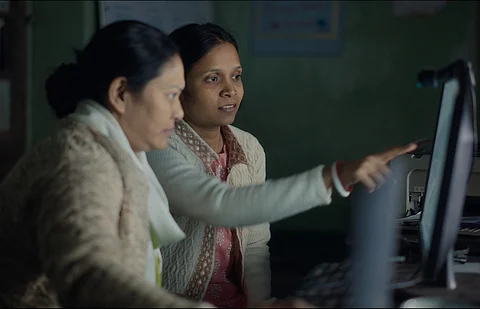

Humans in the Loop (Hindi)
A kind of hypnotic atmosphere permeates the screen as soon as the very first visual glows up in Aranya Sahay’s Humans in the Loop. A teenage Adivasi girl (later introduced as Nehma, the film’s protagonist) rests on dense grass in the wilderness and stares merrily into nothing. A porcupine approaches her and their eyes lock, but without any apparent tension, as though there is a sense of uncanny trust between them. Saransh Sharma's ambient soundtrack infuses a dream-like quality to this moment.
For debutant Aranya Sahay, the moment means much more than meets the eye. It is here that he elicits the theme of his film: Could these antithetical beings forge some kind of amity without saying a word to each other? Humans in the Loop soon becomes an exploration of a delicate camaraderie such as this, where human life tacitly interacts with another being and fosters mutual evolution.
The other being, of course, is revealed to be Artificial Technology (AI). When Nehma (Sonal Madhushankar), moves back from Ranchi to her village near Jonha Falls in Jharkhand after nearly a decade, she learns that the social landscape around her has changed considerably.
There's an AI data labelling centre that's emerged in the area where many young women are employed to examine a vast collection of random images and videos from across the world. They identify and label different kinds of objects in this data – from cars and people to everything imaginable – and are told that their work is helping Artificial Intelligence learn and grow.
Growth is the operative word because Nehma identifies a child-like innocence about AI that could be nurtured and moulded with the right kinds of values. But what if the very child she is grooming is pre-equipped with the same social biases as the humans around her? As a woman from the marginalised Oraon tribe, Nehma has seen her heritage and identity being discredited all her life. So when she realises that even an abstract specimen like AI is prejudiced because of what others have fed it, she finds it rather unsettling.
Aranya Sahay treats this theme of an unconventional parental bond with poignancy and care, infusing many layers and motifs into his storytelling. On the one hand, Nehma's journey tackling technology and its double-edged implications forms a foundation for the narrative, while on the other, her pensive relationship with her 12-year-old daughter Dhaanu takes a shape of its own. Nehma's innocence and wisdom are able to guide an intangible technology but the same traits aren't helpful when she is dealing with her daughter. Her tender side comes to be at loggerheads with her own rigidity, and Sahay is impressively deft in handling these two sides of hers.
He also relays a few evocative snapshots from Nehma's childhood to show how she grew to be a perceptive human being who places nature above everything else. "If you put your ear to a rock and listen carefully, you find that it too has a beating heart," she says, quoting her father. The same ethos must be now passed down to Dhaanu but for that, she must first pause and listen to what the young girl's heart says.
Humans in the Loop is a story that stems not only from rigorous investigation of a subject and its milieu, but also empathy towards them all. It brings in many elements including succinct yet sharp commentary about how indigenous tribes in Jharkhand, and India at large, live and work. Nehma’s Dhuku marriage, the caste dynamics with her ‘forward caste’ ex-partner and many other social aspects seamlessly join the rich tapestry that Aranya Sahay weaves, all along offering a very rare kind of visual-aural experience.
Running at 74-minutes, the film is shot and presented in a 1.55:1 aspect ratio — Harshit Saini and Monica Tiwari's cinematography is exquisite. The framing choice lends a unique gaze towards a set of people one knows very little about, while also creating a storybook-like intimacy on screen. Sound designer Kalhan Raina and the Team's contribution, too, merits acknowledgement.
One could argue that the film is a bit too idealistic when dealing with complex problems, but the magic also lies in the same unwavering positivity. Ridding itself of the cliches of a "film about technology", Humans in the Loop is a tale that is both cautionary and endearing. Its worldview is refreshing and so is its will to readily embody its central character's pure-heartedness. All things combined, it is a great new entrant to the burgeoning Indian indie scene.
The film was screened at the 16th edition of the Bengaluru International Film Festival, as part of the Indian Cinema Competition.
Swaroop Kodur is a freelance film writer, critic, and fledgling filmmaker.
Disclaimer: This review was not paid for or commissioned by anyone associated with the film. Neither TNM nor any of its reviewers have any sort of business relationship with the film’s producers or any other members of its cast and crew.